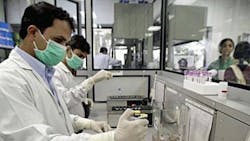WASHINGTON -- U.S. authorities announced Monday a $500 million fine against Indian generic pharmaceutical manufacturer Ranbaxy after it pleaded guilty to selling adulterated drugs in the United States.
Ranbaxy USA, the U.S. subsidiary of Ranbaxy Laboratories Limited, based near New Delhi, pleaded guilty to seven counts of felony after it distributed several India-produced adulterated generic drugs in the US in 2005-2006.
It agreed to pay a criminal fine and forfeiture of $150 million, and another $350 million to settle civil charges, the Justice Department said in a statement.
The Justice Department said it was the largest-ever drug-safety settlement with a generic drug manufacturer.
A former Ranbaxy executive, Dinesh Thakur, will receive approximately $48.6 million from the fines as a whistle-blower in the case.
Ranbaxy, taken control of by Japan's Daiichi Sankyo in 2008, had imported to the United States adulterated batches of the the acne drug Sotret (isotretinoin), the epilepsy drug gabapentin, and the antibiotic ciprofloxacin.
The drugs were all made in its Paonta Sahib facility near Chandigarh, which U.S. Food and Drug Administration inspectors cited for poor record keeping and an inadequate testing for the stability of the drugs over time.
The company also admitted to making false and fraudulent statements to the FDA in 2006-2007 on stability tests made on several other export drugs.
"The investigation that led to this settlement uncovered evidence showing that certain lots of specific drugs produced at the Paonta Sahib facility were defective, in that their strength differed from, or their purity or quality fell below, that which they purported to possess," said John Roth, director of the FDA's Office of Criminal Investigations.
Since last year the Paonta Sahib facility and another, in Dewas, have been blacklisted from producing drugs for the U.S. market until they can meet U.S. drug standards.
In a statement Ranbaxy Laboratories chief executive Arun Sawhney said the company was "disappointed by the conduct of the past that led to this investigation."
"We strongly believe that settling this matter now is in the best interest of all of Ranbaxy's stakeholders," he said.
Copyright Agence France-Presse, 2013
About the Author
Agence France-Presse
Copyright Agence France-Presse, 2002-2025. AFP text, photos, graphics and logos shall not be reproduced, published, broadcast, rewritten for broadcast or publication or redistributed directly or indirectly in any medium. AFP shall not be held liable for any delays, inaccuracies, errors or omissions in any AFP content, or for any actions taken in consequence.
